The Genron NPO recently carried out public opinion surveys jointly with South Korea's East Asia Institute and China's Horizon Research Consultancy Group to learn the views of people in Japan, China and South Korea about the future of Northeast Asia, and the security challenges facing the region.
Northeast Asia is changing, as instanced by China's increasing political clout and instability on the Korean Peninsula amid North Korea's nuclear ambitions, but there is no regional political governance to ensure a peaceful order in this part of the world and various factors that could trigger a conflict are sources of concern for the peoples of countries involved.
How should we pursue a peaceful order in Northeast Asia amid the current instability? What challenges must we address to that end? Then, as Japan, China and South Korea have direct interest in the regional situation, how should the peoples of the three countries work together for peace in Northeast Asia? These issues are at the heart of our awareness of the need to overcome the challenges facing the region.
The latest three-nation opinion survey, conducted through the end of October, was the second of its kind, following one in 2015. A total of 3,530 people cooperated in the surveys in the three countries.
Next 10 years in Northeast Asia region
How do they view the changes foreseen for the next 10 years in the region?
The transformation in the region stems mainly from China's increasing political presence while the United States intends to return to Asia, but its actions are not fully understood by many people in Asia. This was clear from the views of three countries' peoples in last year's surveys. There was no major shift in the basic public views in the three countries this time.
According to the findings of the latest surveys, more than half of those polled in Japan, specifically 51.9 percent, expect China's political influence in the region to increase in the next 10 years. A comparable figure for South Koreans polled came to 71.2 percent. As to whether U.S. influence in the region will grow in the next 10 years, the answer "no change" was most frequently cited by the people polled in the three countries. (table 1)
However, some important differences appear in the views of the three countries' peoples in the past year. First, the percentage of those foreseeing a further increase in China's political influence in Asia declined in all responses in the three countries when compared to last year. This tendency was particularly seen among those polled in China, though the Chinese have been generally satisfied with their country's growing political clout in recent years. In the latest survey, the percentage of Chinese foreseeing a further increase in its political influence in the next 10 years fell to 66.4 percent, sharply down from 82.5 percent a year earlier. Conversely, those expecting the country's political influence to shrink grew from last year, if not sharply, to 5.7 percent from 1.6 percent.
Another major difference in the latest surveys was a significant worsening of Chinese people's views of South Korea. Some 30.6 percent of the Chinese polled replied that South Korea's influence in the region will decline in the next 10 years, far surpassing the year-before figure of 8 percent. (Table 2)
The deteriorating views of South Korea reflected a rift between the two countries over the planned deployment of the THAAD (terminal high altitude area defense) missile system for U.S. troops stationed in South Korea. The Chinese media's campaign against South Korea was also behind the Chinese people's soured views toward Seoul.
Table 1. China's influence in Asia in 10 years
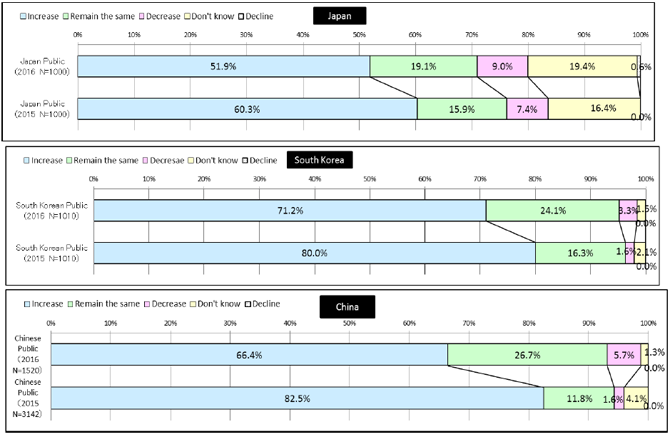
Table 2. South Korea's influence in Asia in 10 years
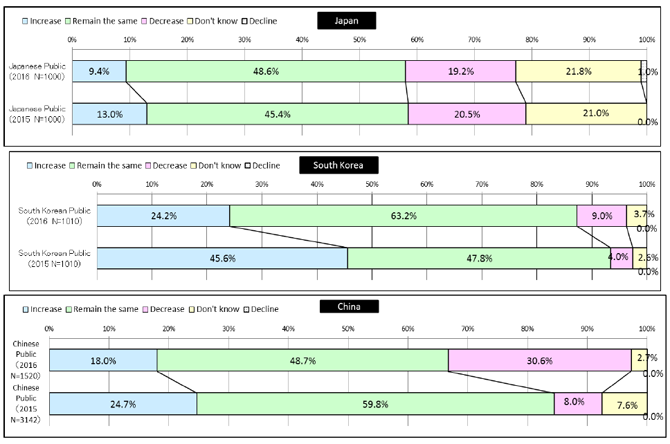
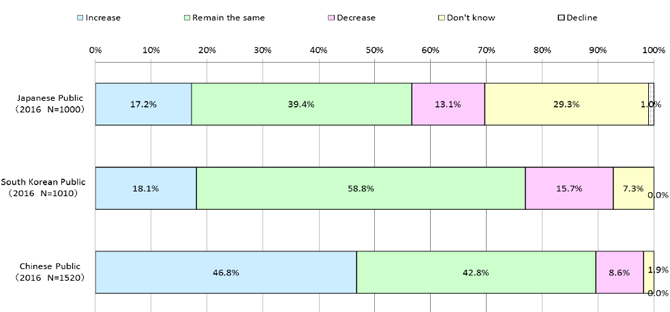
The latest surveys indicate that the views of the three countries' peoples about the situation in Asia in the next 10 years were about to change significantly in so short a period as one year. This illustrates how drastically the regional situation is changing.
Behind the transformation is a series of moves by China to realign its economy, which has served as a prime mover for the world economy. But the recent tendencies in public opinion in the three countries rather reflect a difficult, unstable security environment in the region. China's increasing political presence is in direct opposition to the hub-and-spoke security system built around the United States, causing people to be more concerned than ever about peace in the region.
Values to be pursued for countries in East Asia - Peace
Peace has come to be viewed among the peoples in the region as a more important challenge for Asia in the future. When asked about a value that must be pursued for countries in East Asia, peace was cited by 64.3 percent of Japanese polled, 41.5 percent of Chinese and 50.3 percent of South Koreans. The findings were the same as last year, and the result indicates many people in this region strongly hope to see peace, which can be taken as "the voice of a calm majority." (Table 4) But the peoples of the three countries lack a vision for realizing a peaceful order in the region.
Table 4. Values to be pursued for countries in East Asia
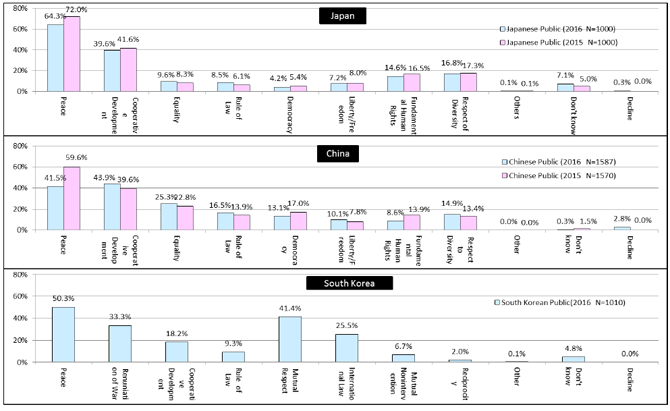
This is why we introduced this time the question: "Do you think a peaceful order, including China and the United States, will be realized despite their current rivalry in East Asia?" Affirmative replies came from only 14.0 percent of Japanese polled and 27.8 percent of South Koreans. The answer "don't know" accounted for 57.5 percent of the Japanese respondents. Of South Koreans polled, 48.5 percent gave negative replies. Conversely, 48.7 percent of Chinese polled replied a peaceful order will be realized. But this should be taken to indicate that this is what they want.
Table 5. Will peaceful order in East Asia be realized?
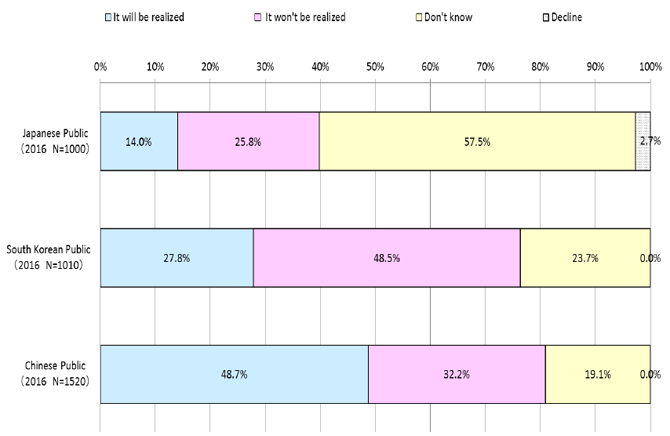
Who is the most reliable Partner?
In the latest surveys, the polled people were asked to pick the most reliable partner from among countries in the Asia-Pacific region. The United States was mentioned by 81.8 percent of Japanese polled while 76.1 percent of them saw China as an unreliable partner.
In the survey in China, Russia was cited as the most reliable partner by 80.7 percent of the respondents. The most notable finding in the latest survey was a change in Chinese people's views of South Korea. Specifically, Chinese who believe South Korea is reliable accounted for 34.9 percent of the respondents, sharply down from 56.3 percent a year earlier. Conversely, Chinese who believe South Korea is unreliable grew to 61.1 percent, up from the year-before level of 36.8 percent.
Among South Koreans, the United States was chosen as the most reliable country by 83.2 percent of the respondents. There is no comparison with the previous year because the question was introduced for the first time this year. Those who believe Japan is unreliable amounted to 75.7 percent. South Koreans' views proved to be rather mixed about the reliability of China, with 52.7 percent of those polled viewing the country as unreliable and 34.4 percent viewing it as reliable. (Table 6)
Table 6. Is South Korea a reliable partner?
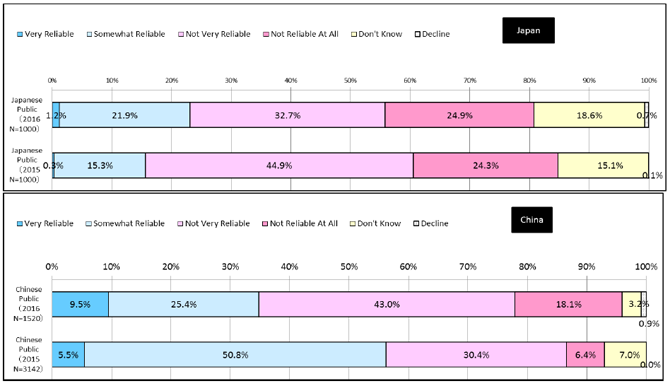
The latest surveys examined Chinese people's views about the possibility of U.S. military intervention in a territorial dispute between Japan and China over a group of islands in the East China Sea. Of the Chinese polled, 64.0 percent expected the United States to intervene in the dispute militarily if a military confrontation is triggered by China against Japan over the issue. Meanwhile, 68.8 percent of them expected the United States to do so if a military confrontation is triggered by Japan against China. At a time when there are unfavorable signs in the security environment in Northeast Asia and there is no dialogue to find a solution, Japan, China and South Korea expect to hold a leaders' meeting in Tokyo as early as December.
Table 7. Using U.S. troops "in the case of military conflict between China and Japan over the Senkaku islands"
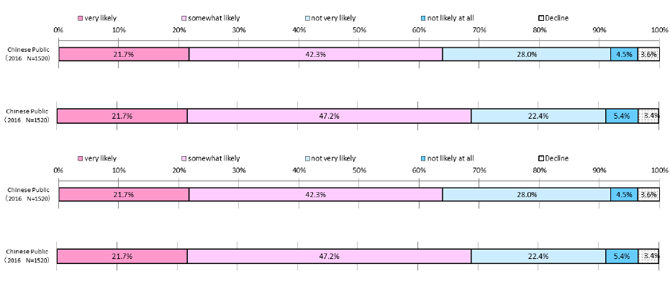
Replies by those polled in the three countries about which subject should be discussed at the tripartite meeting tell us that the three countries should take the occasion to first do all they can to strengthen their mutual trust, since they lack a vision to realize stability in the region.

Post a comment